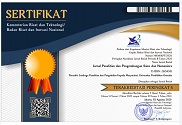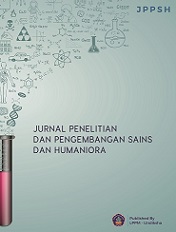Contemporary Approaches to Qur'anic Hermeneutics
DOI:
https://doi.org/10.23887/jppsh.v8i2.83869Keywords:
Contemporary, Qur’anic Hermeneutics, Revelation, Interpretation and ScholarsAbstract
The problem in this study focuses on the significant changes in Qur'ānic hermeneutics in the modern era, where traditional approaches are often considered inadequate in addressing contemporary issues. This discrepancy creates a need for a more contextualized and inclusive approach to interpretation. This study aims to analyze the transformation of Qur'ānic hermeneutics and offer a more contextual approach without ignoring traditional values. The research used a descriptive qualitative method with a literature review design. The research subjects comprised 15 Muslim scholars and scholars involved in contemporary Qur'anic interpretation. Data were collected through document analysis and in-depth interviews, using an interview guide as an instrument. Data analysis was conducted through content and thematic analysis approaches. The results showed that the contemporary hermeneutic approach is more adaptive to modern social and cultural changes, enriching a more inclusive and contextual interpretation methodology. This study concludes that the transformation of Qur'anic hermeneutics offers interpretations more relevant to the challenges of the times. The implication of this research shows the need for a flexible hermeneutical method to support Muslims' understanding in the modern context.
References
Al-Ayyuubi, M. S., & Haris, A. (2024). Konstruksi Literasi Keagamaan dalam Tafsir The Study Qur’an. Contemporary Quran, 4(1), 65–80. https://doi.org/10.14421/cq.v4i1.5677.
Alawiyah, D. T., Efitra, E., & Uzma, I. (2024). Metodologi Studi Islam : Pendekatan Kontemporer dan Tradisional (Efitra (ed.)). PT. Sonpedia Publishing Indonesia. https://books.google.co.id/books?id=vcP3EAAAQBAJ.
Alkouatli, C. (2024). Illuminating data beyond the tangible: exploring a conceptually-relevant paradigmatic frame for empirical inquiry with Muslim educators. International Journal of Qualitative Studies in Education, 37(8), 2466–2484. https://doi.org/10.1080/09518398.2024.2318301.
Amali, S. A., & Suhartini, A. (2024). Pembebasan Kaum Perempuan dalam Tradisi Pendidikan Islam: Analisis Historis dan Kontemporer. Tsaqafatuna, 6(1), 44–53. https://doi.org/10.54213/tsaqafatuna.v6i1.391.
Barokah, M., Alamsah, J., Tinggi, S., Islam, A., Lampung, D., & Ningrum, A. P. (2023). Larangan Menimbun Harta Dalam Al-Qur’an (Analisis Metode Tafsir Maudhu’i Fazlur Rahman). Al-Dzikra: Jurnal Studi Ilmu Al-Qur’an Dan Al-Hadits, 17(2), 313–324. https://doi.org/10.24042/002023177018000.
Bu’ulolo, S., & Tioma, R. (2023). Kepemimpinan Wanita Kristen: Pengaruh Dan Tantangan Dalam Konteks Gereja Modern. Coram Mundo: Jurnal Teologi Dan Pendidikan Agama Kristen, 5(1), 181–199. https://doi.org/10.55606/corammundo.v5i1.177.
Diman, P. (2020). Nyanyian Adat Masyarakat Dayak Maanyan: Suatu Pendekatan Hermeneutika. Jurnal Pendidikan, Bahasa, Sastra, Seni, Dan Budaya /, 1(1), 40–56. https://doi.org/10.37304/enggang.v1i1.2461.
Dozan, W., & Turmudzi, M. (2021). The Concept of Hermeneutics As a Methodology of Interpretation of the Qur’an Text. HUNAFA: Jurnal Studia Islamika, 18(2), 241–261. https://doi.org/10.24239/jsi.v18i2.554.241-261.
Drajat, A., Mustapa, & Warnisyah Harahap, E. (2024). Rajah dan Spiritualitas Lokal dalam Hukum Islam; Studi Analisis Tafsir Hermeneutik. Jurisprudensi: Jurnal Ilmu Syariah, Perundang-Undangan Dan Ekonomi Islam, 16(1), 225–140. https://doi.org/10.32505/jurisprudensi.v16i1.8071.
Fahimah, S. (2021). Geliat Penafsiran Kontemporer: Kajian Multi Pendekatan. Al Furqan: Jurnal Ilmu Al Quran Dan Tafsir, 4(2), 255–272. https://doi.org/10.58518/alfurqon.v4i2.757.
Faisal, M., & Th, M. (2021). Kontribusi T.M Hasbi Ash-Shiddieqy Dalam Pengembangan Ilmu Al-Qur’an Dan Tafsir Di Indonesia. Al-Bayan: Jurnal Ilmu Al-Qur’an Dan Hadist, 4(1), 30–31. https://doi.org/10.35132/albayan.v4i1.101.
Faqih, M. W. (2023). Sejarah Perkembangan Tafsir. Jurnal Dirosah Islamiyah, 6(1), 197–206. https://doi.org/10.47467/jdi.v6i1.5835.
Harriguna, T., & Wahyuningsih, T. (2021). Kemajuan Teknologi Modern untuk Kemanusiaan dan Memastikan Desain dengan Memanfaatkan Sumber Tradisional. ADI Bisnis Digital Interdisiplin Jurnal, 2(1 Juni), 65–78. https://doi.org/10.34306/abdi.v2i1.448.
Hovey, R. B., Vigouroux, M., Noushi, N., Pavate, V., & Amja, K. (2022). Applied Philosophical Hermeneutic Research: the unmethod. International Journal of Qualitative Methods, 21(1), 1–9. https://doi.org/10.1177/16094069221101237.
Imarotuz Zulfa. (2024). The Application of Hermeneutics in Indonesia as a Koranic interpretation Method. Journal of Islamic Scriptures in Non-Arabic Societies, 1(1), 18–38. https://doi.org/10.51214/jisnas.v1i1.769.
Jailani, M., & Nur kholis. (2021). Kajian Pendekatan Hermeneutika dalam Tafsir Al- Qur’an. Journal of Qur’an and Hadits Studies, 10(1), 93–120.
Jannah, H. (2020). Ulama Perempuan Madura: Otoritas dan Relasi Gender (Y. Elga (ed.)). IRCiSoD. https://books.google.co.id/books?id=wbj8DwAAQBAJ.
Jedličková, L., Müller, M., Halová, D., & Cserge, T. (2022). Combining interpretative phenomenological analysis and existential hermeneutic phenomenology to reveal critical moments of managerial lived experience: a methodological guide. Qualitative Research in Organizations and Management: An International Journal, 17(1), 84–102. https://doi.org/10.1108/QROM-09-2020-2024.
Leida, L. S. Y. (2024). Upacara Adat Turun Bantayan di Desa Cikeleng Kecamatan Japara Kabupaten Kuningan (kajian hermeneutik). Lingue: Jurnal Bahasa, Budaya, Dan Sastra Pusat Pengembangan Bahasa IAIN Ambon, 6(1), 62–73. https://doi.org/10.33477/lingue.v6i1.7588.
Manalu, Y., Simatupang, R. H., & Br. Silaen, C. F. (2024). Kesetaraan Gender Dalam Bingkai Kebinekaan Indonesia. JOLASOS : Journal Of Law And Social Society, 1(1), 27–40. http://rumah-jurnal.com/index.php/jolasos/article/view/81.
McCaffrey, G., Wilson, E., Jonatansdottir, S., Zimmer, L., Zimmer, P., Graham, I., Snadden, D., & MacLeod, M. (2022). But is It Hermeneutic Enough?: Reading for Methodological Salience in a Scoping Review of Hermeneutics and Implementation Science. International Journal of Qualitative Methods, 21(1), 1–9. https://doi.org/10.1177/16094069211070408.
Mutmainnah, M. (2024). Epistemology of Thought Study of Muhammad Imarah View On Th Presence Of Hermeneutics As A Methiode Of Interpretation. Jurnal Ushuluddin, 32(1), 74. https://doi.org/10.24014/jush.v32i1.29073.
Nata, A. (2022). Fungsi-fungsi Al-Qur’an dalam pengembangan ilmu, kebudayaan dan peradaban. Ta’dibuna: Jurnal Pendidikan Islam, 11(3), 352. https://doi.org/10.32832/tadibuna.v11i3.7609
Nurcahaya, N., & Akbarizan, A. (2023). Perempuan dalam Perdebatan: Memahami Peran dan Tantangan Berpolitik dalam Perspektif Hukum Islam. JAWI: Journal of Ahkam Wa Iqtishad, 1(3), 108–116. https://doi.org/10.5281/zenodo.8397647
Ramadhan, S. (2024). Mengeksplorasi Status Hukum Musik Melalui Perspektif Hadits. El-Sunnah: Jurnal Kajian Hadis Dan Integrasi Ilmu, 5(1), 72–93. https://doi.org/10.19109/elsunnah.v5i1.22199.
Rizki, N. J., Yurna, Erviana, R., Nurafifah, S., & Babullah, R. (2023). Metodologi Studi Islam (Perspektif Arkoun dan Ibrahim M. Abu Rabi). Jurnal Pendidikan Indonesia (JOUPI), 1(3), 147–159. https://doi.org/10.62007/joupi.v1i3.76.
Safudin, E., Baihaqi, A., Syakirin, A., Imtihanah, A. H., Kususiyanah, A., Pahlevi, F. S., & Abdullah, F. (2022). Memahami Teori Hukum: Percikan Pemikiran Ilmu Hukum Lintas Mazhab (A. Rohmanu (ed.)). Q Media. https://books.google.co.id/books?id=VfexEAAAQBAJ.
Sassi, K. (2021). Diskursus Hermeneutika sebagai Metode Interpretasi Ruh Teks. Jurnal AT-TAHFIZH: Jurnal Ilmu Al-Qur’an Dan Tafsi, 2(02), 32–49. https://ejournal.iaiqi.ac.id/index.php/attahfidz/article/view/41.
Syamsuddin, S. (2021). Differing Responses to Western Hermeneutics: A Comparative Critical Study of M. Quraish Shihab’s and Muḥammad ‘Imāra’s Thoughts. Al-Jami’ah, 59(2), 479–512. https://doi.org/10.14421/ajis.2021.592.479-512.
Tarlam, A. (2022). Hermeneutik dan Kritik Bible. AL-KAINAH: Journal of Islamic Studies, 1(2), 103–118. https://doi.org/10.69698/jis.v1i2.16.
Downloads
Published
Issue
Section
License
Copyright (c) 2024 Sanusi Lafiagi Haruna

This work is licensed under a Creative Commons Attribution-ShareAlike 4.0 International License.
Authors who publish with the Jurnal Penelitian dan Pengembangan Sains dan Humaniora agree to the following terms:
- Authors retain copyright and grant the journal the right of first publication with the work simultaneously licensed under a Creative Commons Attribution License (CC BY-SA 4.0) that allows others to share the work with an acknowledgment of the work's authorship and initial publication in this journal.
- Authors are able to enter into separate, additional contractual arrangements for the non-exclusive distribution of the journal's published version of the work (e.g., post it to an institutional repository or publish it in a book), with an acknowledgment of its initial publication in this journal.
- Authors are permitted and encouraged to post their work online (e.g., in institutional repositories or on their website) prior to and during the submission process, as it can lead to productive exchanges, as well as earlier and greater citation of published work. (See The Effect of Open Access)









